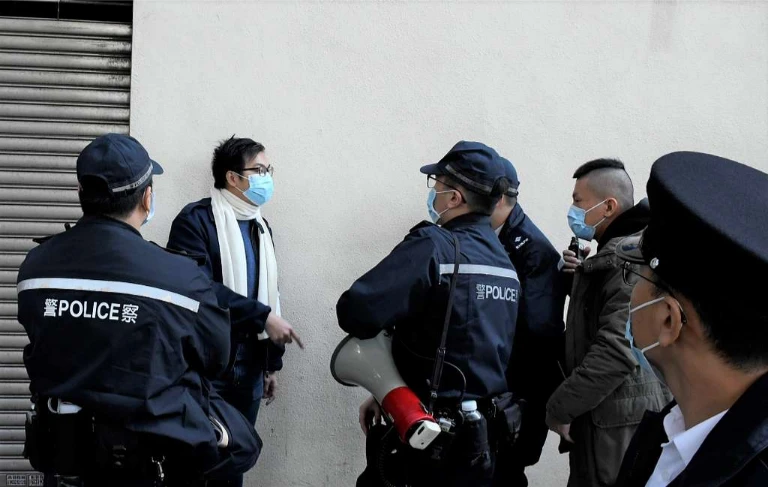China’s recent sentencing of 45 pro-democracy leaders marks a significant escalation in its crackdown on dissent in Hong Kong, igniting international outrage and laying bare the ideological rift between the West and Beijing.
The central government’s liaison office in Hong Kong has voiced its “firm support” for the jailing of 45 opposition figures for trying to overthrow the government and has condemned the US and other countries for “attacks” against the city’s judicial system.
The comments came two days after a court sentenced the opposition figures for conspiring to subvert state power through a “primary” election held four years ago in the aftermath of anti-government protests.
The sentences ranged from four years and two months to 10 years, with former University of Hong Kong legal scholar Benny Tai Yiu-ting, 60, deemed the mastermind behind the scheme and receiving the heaviest sentence.
An office spokesman said the criminals, led by Tai, conspired under the guise of democracy to gain a majority in the Legislative Council through the primary election.
Their aim was to indiscriminately veto the government’s budget, forcing the chief executive to dissolve the council and eventually resign, thereby paralyzing the government.
The activists, many of whom were key figures in Hong Kong’s opposition movement, were prosecuted for their involvement in unofficial primaries ahead of the 2020 legislative elections.
These primaries were designed to consolidate pro-democracy candidates to challenge pro-Beijing dominance, but Beijing saw them as subversive attempts to undermine its authority.
From a Western perspective, these convictions represent a fundamental assault on political freedoms and the rule of law.
The activists were exercising rights enshrined in international norms, including the freedom of assembly, speech, and democratic participation.
Such rights are seen as universal in liberal democracies and are particularly significant in Hong Kong, which operated under the promise of “one country, two systems” following its handover from British to Chinese sovereignty in 1997.
The West views Beijing’s actions as a breach of that promise and a violation of the Basic Law, Hong Kong’s mini-constitution. The arrests and subsequent sentences are thus interpreted as part of a broader campaign to dismantle the city’s semi-autonomous status and silence dissenting voices.
From the perspective of the Chinese Communist Party (CCP), the crackdown is framed as a necessary step to safeguard national security and political stability.
Beijing has long viewed Hong Kong’s pro-democracy movement as a direct threat to its sovereignty, particularly in light of the massive protests in 2019 that rocked the city.
The CCP sees such movements as a challenge to its authority, one that could inspire unrest in other parts of China, such as Tibet and Xinjiang.
The implementation of the National Security Law in 2020, under which the activists were charged, is presented as a tool to protect against “secession, subversion, terrorism, and collusion with foreign forces.”
From this perspective, the primaries were not a democratic exercise but a coordinated effort to destabilize Hong Kong and, by extension, China.
The gulf between these perspectives underscores the broader ideological clash between liberal democracies and authoritarian regimes.
The West sees China’s actions as a moral failing, an erosion of freedom, and a betrayal of its commitments. Conversely, Beijing regards its crackdown as a legitimate exercise of sovereignty, prioritizing order and control over Western notions of individual liberty.
U.S. State Department Spokesperson Matthew Miller published a press release in which he stated, “The United States strongly condemns the sentences announced today in Hong Kong’s National Security Law (NSL) trial of pro-democracy advocates, known as the NSL 47. The 45 defendants sentenced today were aggressively prosecuted, and many now face life-altering imprisonment simply for their peaceful participation in political activities which are protected under the Basic Law of Hong Kong. In response, the Department of State is taking steps to impose new visa restrictions on multiple Hong Kong officials responsible for implementation of the NSL, pursuant to Section 212(a)(3)(C) of the Immigration and Nationality Act. We will continue to monitor the implementation of Hong Kong’s national security laws and promote accountability for human rights in the PRC and Hong Kong.
“We call on Hong Kong authorities to immediately and unconditionally release these 45 individuals and similarly detained political prisoners. These harsh sentences erode confidence in Hong Kong’s judicial system and harm the city’s international reputation. We continue to urge the PRC government and Hong Kong authorities to uphold Hong Kong’s judicial independence, cease the use of vague national security laws to silence those peacefully expressing their political views, and restore the openness that was so crucial to Hong Kong’s vitality and success.”
The jailing of these leaders is not just a local tragedy but a stark indicator of the shifting global order.
It challenges the international community to reckon with the limits of diplomacy and raises critical questions about the future of democracy in Hong Kong.
As Beijing tightens its grip, the global response—or lack thereof—will shape not only the lives of Hong Kong’s people but also the broader contest between authoritarianism and democracy.
